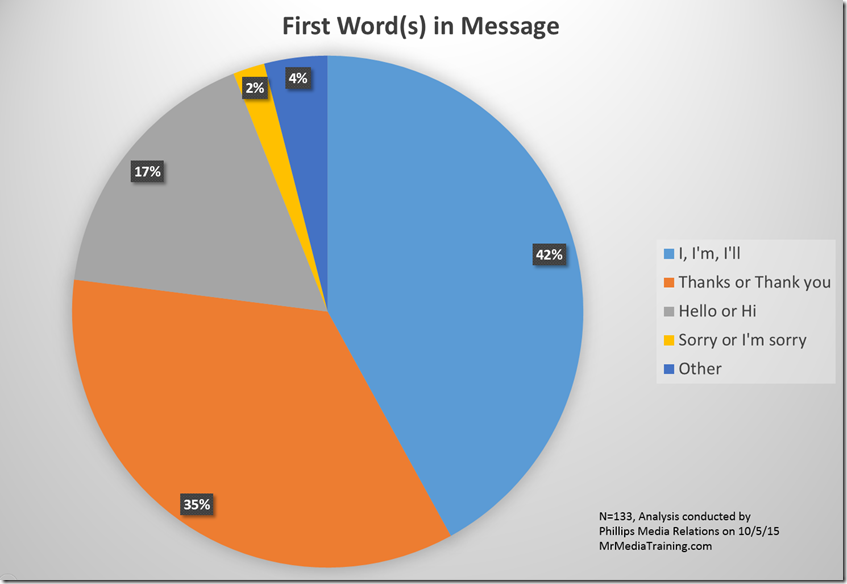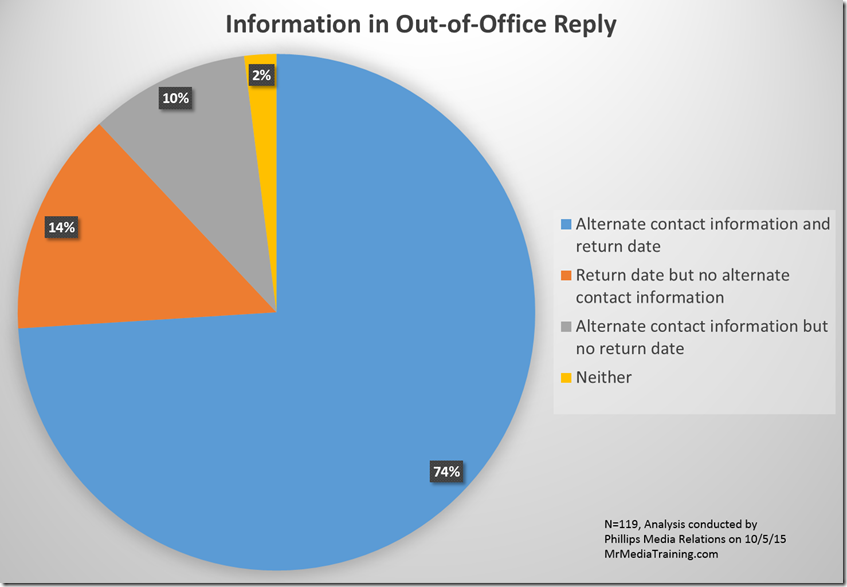What Do Your Email "Out-Of-Office" Replies Say About You?
Whenever we send out our email newsletter (sign up here!), we receive more than 100 out-of-office replies.
If you buy the premise that every message you send communicates something about you, then your out-of-office reply is communicating for you while you’re away from work. Your coworkers, long-time clients, and family members are unlikely to form opinions about you from that automated message — but what about the prospective partners, clients, and customers who have never interacted with you before?
After sending our latest email October 5, I went through the 133 automated replies we received to see what patterns I could detect. The first thing I was curious about was what words people used to begin their out-of-office replies. The most common autoreply starter was either “I” or one of its variants, “I’m” or “I’ll.” That may not be a problem, but it is a word that is automatically more about the person who is out of the office than the person emailing them.
“Thank you” or “Thanks” was a close second, and “Hello” or “Hi” (or, in a few cases, an enthusiastic “Hello!”) was the third most popular greeting.

None of the replies I received were bad, per se (the fact that someone set an auto responder at all is preferable to radio silence), but only one person used their message to express their personality:
“I’m out of the office recovering from a bit of heart surgery so I will not be allowed to look at email for fear that I’ll get over-excited and short out. “
Although I love that message, you don’t have to be quite that creative to stand out from other emailers. For example, I’ve used a reply along these lines in the past:
“If you’ve emailed me before, you know that I pride myself on responding to emails with lightning speed. Sometimes, I bump into things because I’m responding to people from my iPhone on the sidewalk without looking where I’m walking. Yes, I’m one of those people. I’m not proud of it.
From now until Thursday, February 13, I’ll be slower to respond than usual. I look forward to responding to you quickly upon my return.”
One recent client suggested an out-of-office reply along these lines:
“I’m out of the office until October 19. I could write that I won’t be checking messages while on vacation, but you know that’s not true. Almost all of us sneak a peek at our phones while we’re away, and I’m no different.
But I’d like to unplug as much as possible, so here’s the deal: If you need to reach me immediately after you get my autoreply, email me back telling me you need to speak immediately. I’ll tell my family I need a few minutes to return a call, which they’ll probably understand. But if it’s not urgent, I promise to get back to you when I’m back in the office.”
Not everyone can pull that type of message off — but it’s a clever option for some professionals, particularly those of us who feel guilt-addled when we make people wait for our response. Alternatively, you can earnestly admit that you have a tough time unplugging and enlist their help as an ally to help you protect your rare precious week off.
For people only taking a day or two off, there’s still a chance to inject some personality. A person working for a wildlife conservation nonprofit might write:
“I’ll be out of the office until Wednesday, but will come back refreshed and ready to protect the 18,000 threatened species that need our help. If you need anything before my return, Mary Smith will be fighting on their behalf in my absence. You can reach her at mary.smith@savetheanimals.com.”
The second question I was interested in was whether people followed the best practice of providing both alternate contact information and their return-to-office date. I was surprised — and delighted — to find that almost 3 in 4 people did. Of the remaining one-quarter, almost everyone included either their alternate contact information or their return date.

One of the people who didn’t include a return date was on maternity leave (fair enough). A few others may have been ill or on bereavement, so putting a return date would have proven difficult. As for the people without an alternate contact, I’m guessing a few didn’t have one (perhaps they’re sole practitioners) — but I was surprised that several people working for larger companies didn’t include one.
If you give great thought to the public impression you’re forming, you might think about the out-of-office reply that greets dozens or hundreds of your contacts. If you have a particularly creative approach to your autoreplies, please leave it in the comments section below — I’d love to learn from you. (The New York Times also recently ran an amusing article on this topic.)

Here’s mine from last month:
“Hi there – I’m taking a break from email for the holidays. While I’m not quite giving up my iPhone, I won’t be checking it as if it were an appendage of my hand. I’ll save that for Monday, December 28. Merry Christmas!”